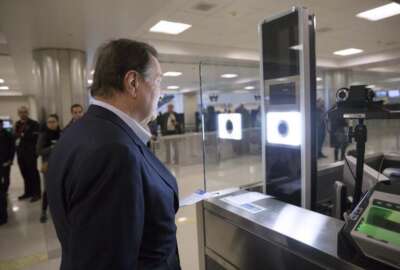
No dance step or sidestep can help avoid the TikTok ban
In today's Federal Newscast: There's no dance step or sidestep to help avoid the TikTok ban. The Director of CISA calls for changes in how tech companies design...
- A federal ban on TikTok on government-owned devices is coming into focus. The Office of Management and Budget is giving agencies 30 days to remove TikTok and other apps from the Chinese company ByteDance from government-issued devices. The OMB guidance also gives agencies 90 days to ensure new contracts do not include any mention or use of TikTok and to cease any contracts that require the use of the app. Congress included the TikTok ban as part of the Fiscal 2023 spending bill.
- Praising companies like Apple, Google and Amazon for their efforts to use secure coding techniques and adopt multifactor authentication, a top federal cyber leader called for changes in how tech companies design their products. Cybersecurity and Infrastructure Security Agency Director Jen Easterly, addressing Carnegie Mellon University Security and Privacy Institute, said technology should be secure by design. "Every organization should demand transparency regarding the practices and controls adopted by technology providers and then demand adoption of such practices as basic criteria for acceptability before procurement or use,” Easterly said. She also said the government can use its purchasing power and acquisition requirements to incentivize secure technologies.(CMU Distinguished Lecture: Jen Easterly - Carnegie Mellon University )
- Internal challenges could hinder the Office of Personnel Management's ability to help other agencies close governmentwide skills gaps. OPM can do more to improve its internal skills gaps, which include project management, leadership development and data analytics. That is according to a report from the Government Accountability Office. Although OPM has taken some steps to address the issue, like training and hiring staff, GAO said the agency should create a clear action plan to make progress toward closing those internal skills gaps.(OPM Advances Efforts to Close Government-wide Skills Gaps but Needs a Plan to Improve Its Own Capacity - Government Accountability Office)
- A federal employee union expects a ‘challenging environment’ for the IRS, as House Republicans target its $80 billion investment. The IRS is starting to spend down $80 billion in the Inflation Reduction Act on hiring and improvements to taxpayer experience. But the National Treasury Employees Union said Republican lawmakers are still looking at ways to roll back the decade-long investment. NTEU National President Tony Reardon said he does not expect cuts at the IRS to be part of upcoming debt ceiling negotiations, adding that lawmakers are trying to give the IRS flat or reduced annual budgets over the coming years. “There are some in the house that are going to try to find every way humanly possible to claw back that money," Reardon said.(NTEU expects ‘challenging environment’ for IRS as House GOP targets $80B to rebuild workforce - Federal News Network)
- Space Force guardians have a new program to learn how to test-and-evaluate their equipment. The Space Test Course was developed to meet the requirement for space domain-focused training. The program will run at Edwards Air Force Base in California. Guardians enrolled in the 12-month program will receive formal instruction covering topics like orbital mechanics and the electromagnetic spectrum. The agreement marks the culmination of a multi-year effort that began in 2018, when what was then the Air Force Space Command stood up a test-and-evaluation directorate.
- Agencies continue to make progress on closing legacy data centers. The Government Accountability Office reported that agencies closed 58 data centers in fiscal 2021, and were on track to close 78 through the end of fiscal 2022. Over the next three years, agencies plan to shut down an additional 44 data centers, with the Defense Department accounting for 31 of those planned closures. GAO said the Data Center Optimization Initiative has resulted in $6.6 billion dollars in cost savings over the last decade. (Data Center Optimization: Agencies Continue to Report Progress - Government Accountability Office)
- There is one tool agencies may overlook when settling employee discrimination complaints. An “offer of resolution” can give federal employees, who file a complaint, some remedial relief if they choose to accept the offer. The Equal Employment Opportunity Commission's latest report encourages more use of this type of offer. The EEOC recommends agencies use offers of resolution when possible, because they can reduce the costs and fees of attorneys. The commission says agencies should also generally try to use settlement discussions during the EEO process, and avoid litigation if they can.(The Offer of Resolution Settlement Procedure in the Federal Sector - Equal Employment Opportunity Commission)
- A National Geospatial-Intelligence Agency unit is being honored for its work educating policymakers and the public about global events. The OSINT Foundation announced NGA’s Project Tearline as the inaugural winner of its “Unit of the Year Award.” The honor recognizes an intelligence component that has demonstrated exceptional impact to national security, while contributing to the open-source intelligence discipline. NGA's Tearline project runs a public-facing website featuring geospatial data and analysis. It analyzes developments ranging from the war in Ukraine to Taliban rule in Afghanistan to the rise of China’s military.(NGA’s Tearline Awarded Open-Source Intelligence (OSINT) Unit of the Year Award - OSINT Foundation )
- Members of the Air and Space Forces will now be allowed to either travel at government expense or take administrative leave when seeking abortions or other reproductive health care. Like the rest of the military, the Air Force is barred-by-law from directly funding abortions, but the policy aims to make them more accessible to women stationed in states that imposed bans. The update also includes new privacy protections, like not automatically notifying a commander of a pregnancy.
Copyright © 2025 Federal News Network. All rights reserved. This website is not intended for users located within the European Economic Area.
Peter Musurlian
Peter Musurlian is a producer at Federal News Network.
Follow @PMusurlianWFED
Related Stories
(Photo by Glenn Fawcett)





